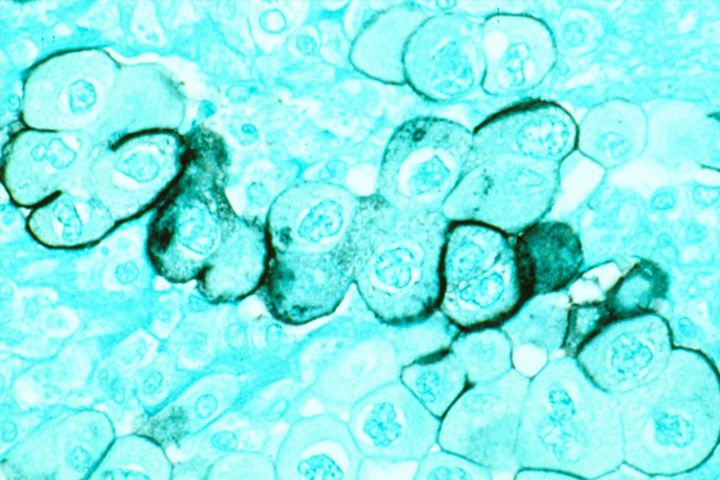Trying a New Type of Treatment to Stop Advanced Pancreatic Cancer

Dr. Lance Liotta Laboratory; National Cancer Institute Visuals Online
Will a new drug that stimulates the immune system work better by itself or in combination with an established chemotherapy combination for metastatic pancreatic cancer?
Researchers are comparing two treatment options in a clinical trial for patients with metastatic pancreatic cancer that has not responded or has stopped responding to prior chemotherapy for metastatic pancreatic cancer.
What is AM0010?
Human recombinant interleukin 10 (IL-10) is an immune growth factor that stimulates CD8+ T cells. This type of T cell can recognize and kill cancer cells. The IL-10 is linked to polyethylene glycol (PEG) to enhance drug delivery. The linked molecule, called AM0010, stays in the body longer, thus working on the CD8+ T cells for a longer time.
Comparing Treatment Options
Researchers are looking to see if adding AM0010 to FOLFOX is more effective than FOLFOX alone. FOLFOX consists of leucovorin (folic acid), fluorouracil, and oxaliplatin. Fluorouracil (5-FU) disrupts a specific part of the cell replication cycle. Because it targets all cells, not just cancer cells, it causes uncomfortable side effects. Leucovorin, which is derived from folic acid, enhances the effects of 5-FU. Oxaliplatin is a platinum compound that damages DNA.
Participants in this trial are randomly assigned to either of two groups. The first group receives AM0010 and FOLFOX, while the second group receives only FOLFOX. The scientists are looking to see if the combination increases the survival time and can stop the progression of the cancer.
This trial is a second-line therapy, given when initial (first-line) treatment does not work or stops working. Participants must have had prior chemotherapy with gemcitabine that failed to stop tumor growth.
We encourage you to consult your physicians for clinical trials that may be right for you. The website ClinicalTrials.gov provides more details about this trial as well as many others. You can visit the Let’s Win Trial Finder for a listing of all active pancreatic cancer clinical trials.
This trial is now complete.





